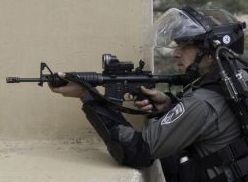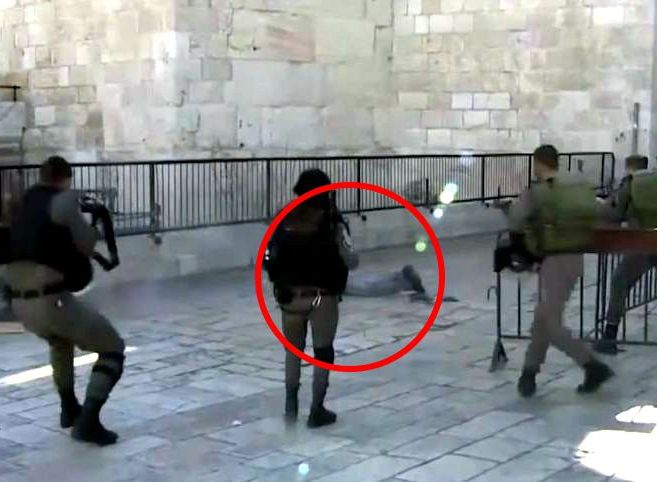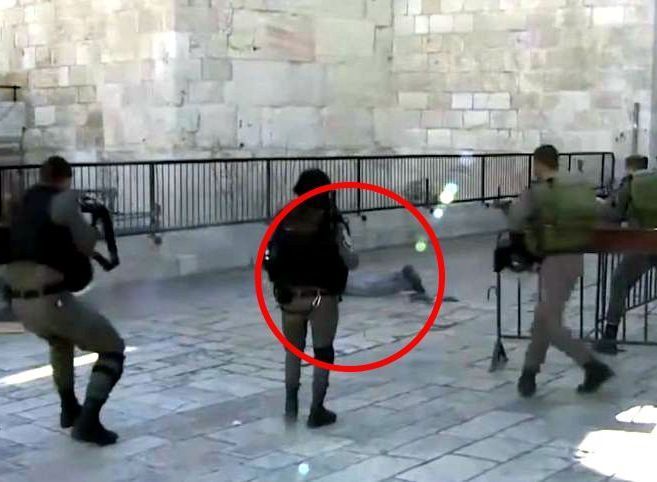Human Rights NGOs in Israel: Azaria's conviction is rarity in Israel’s wider system of impunity for its security forces
The conviction and 18-month sentence to prison of Israeli soldier Elor Azaria for the killing of Palestinian Abdel Fattah al-Sharif in Hebron was a rare outcome in a general trend of impunity regarding attacks by Israeli security forces on Palestinians and their homes.
For many years, the four undersigned human rights organisations have submitted and subsequently monitored numerous complaints to Israeli authorities, which demanded investigations and prosecutions for violations of Israeli and international law by security personnel. These authorities include the Military Police Criminal Investigation Division (MPCID or "Metzach"), the Police Investigation Unit (PIU or "Mahash"), the Prison Service Investigation Division (PSID or "Yahas"), the Inspector for Interrogee Complaints (IIC or "Mavtan"), the Attorney General, and the Military Advocate General (MAG).
Our combined experiences with these Israeli authorities show that in the overwhelming majority of cases, and contrary to international law, investigations are closed, often without justification; no responses are provided to complaints or they exceed the time limitations set by domestic law; few testimonies are gathered from non-security-related witnesses; and complainants are ignored without justice being served. The data from each organization below, covering the years 2014 to 2016, demonstrates these trends:
Attacks on Health Teams: PHRI filed a total of 31 complaints with the PIU, the MPCID and others documenting attacks on Palestinian health care teams that were in violation of international human rights and humanitarian law. These cases include the use of bullets and tear gas on ambulances, removal of injured people from within ambulances, and interference with the work of emergency teams with grave consequences for patients. The vast majority of these complaints were filed in late 2015 and early 2016. Of these, 10 cases received no response. In 9 cases, the PIU refused to open an investigation, claiming that they only investigate offenses that carry a punishment of more than one year, although these cases involved behavior with a potential risk to life, such as instances of shooting at ambulances. PHRI asked for an appeal in 7 of these cases. In 6 other cases, the authorities argued that the circumstances did not justify the opening of an investigation, and in some of these placed blame on PHRI for purportedly failing to cooperate by providing details. In other cases, the authorities opened investigations, but the complainants were not contacted; in two instances, PHRI only received a response after nine months, which the authorities claimed was due to "technical difficulty".
Harm by Israeli soldiers: According to data obtained by Yesh Din from law enforcement authorities, MPCID opened 229 investigations in 2014, and 186 investigations in 2015 into cases that involved suspicions of harm caused to Palestinians in the West Bank and the Gaza Strip by Israeli soldiers, in violation of domestic and international law. These incidents include, among others, looting, abuse or unlawful shooting. Over the past three years, just 3% of the criminal investigations launched resulted in the indictment of suspects. Between 2000 and 2015, MPCID opened at least 262 investigations into cases that led to the deaths of Palestinians. Only 17 of these investigations (6.5%) led to indictments. In 2014 and 2015, 68 cases were opened to which no indictments were served so far. Up until the verdict in the Elor Azaria case, only one soldier was convicted of manslaughter; the victim was of British nationality.
Ill-Treatment and Torture: The case of a 30-year-old woman, who was arrested and interrogated for 47 days with no access to counsel, illustrates several commonly used forms of torture: sleep deprivation, sexual threats and harassment, the use of family members, painful shackling, verbal and physical intimidation, and demeaning detention conditions. Her case is just one of over 1,000 complaints alleging torture and ill-treatment by the Israeli Security Agencies (ISA) since 2001. Even in the Israeli context of impunity, the ISA occupies a unique position: although PCATI's complaints to the PSID since 2014 have led to one conviction and one indictment, so far, not a single complaint to the ISA has led to a criminal investigation or indictment. In the past three years, PCATI has submitted 101 complaints of Palestinians who allege torture and ill-treatment by Israel's security agencies. Of the four investigatory bodies that receive complaints, 39 complaints (39%) were submitted to the IIC, of which 32 are still under examination and 7 have been closed unsatisfactorily. Since January 2014, PCATI filed 12 appeals against the facile closing of files, testifying to the structural nature of impunity for ISA interrogators. 10 appeals have been rejected. Two are still under consideration.
Gaza War: Adalah, together with the Al Mezan Center for Human Rights, filed a series of complaints into 27 cases to the MAG and the AG during and after the 2014 Gaza war, demanding independent investigations into suspected violations committed by the Israeli military. Despite the fact that these 27 cases involved the killings of and severe injury to civilians and extensive damage to civilian property, as of February 2017 – two and half years after the war – no indictments have been issued against any Israeli soldiers or commanders. To date, no investigation has been opened in 12 out of the 27 cases; 6 cases are still under the examination of Israel's Fact-Finding Mechanism; 2 cases are still under the investigation of the Military Police; and no response has been given in 6 cases. In one infamous case – an air strike that killed four boys playing football on a beach, which was witnessed by many international journalists – an investigation was opened, but the file was subsequently closed; an appeal against the decision has been pending since August 2015.
Without proper accountability, ongoing human rights violations will continue to take place. We urge the international community to demand that Israel:
- Carries out independent, prompt, impartial, credible and transparent investigations in accordance with international standards;
- Provides clear, effective, prompt and independent mechanisms of investigations, coupled with timely schedules, by implementing the recommendations of the Turkel Commission;
- Takes concrete actions to ensure that security forces are aware of and honor the protection of medical teams under international law, in accordance with UN Security Council Resolution 2286 in May 2016;
- Implements the recommendations and concluding observations of the UN Committee Against Torture in May 2016 and the UN Human Rights Committee in October 2014, among others, in regards to improving accountability;
- Respects its obligations under international human rights treaties and international humanitarian law, and respects the work of all international bodies monitoring Israel's compliance with those obligations.

















